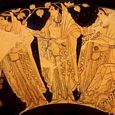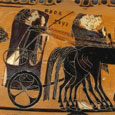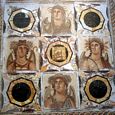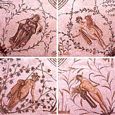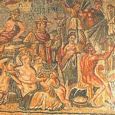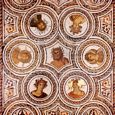HORAI
Greek Name
Ὡρα Ὡραι
Transliteration
Hôra, Hôrai
Latin Spelling
Hora, Horae
Translation
Portion of Time, Season
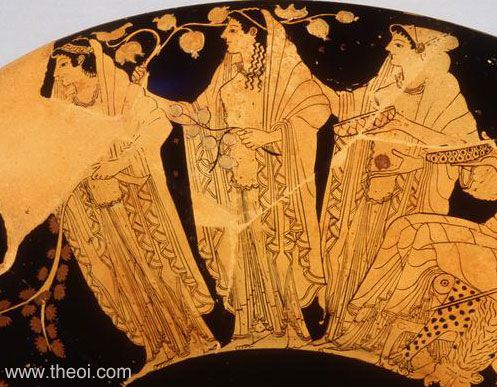
THE HORAI (Horae) were the goddesses of the seasons and the natural portions of time. They presided over the revolutions of the heavenly constellations by which the year was measured, while their three sisters, the Moirae (Moirae) spinned out the web of fate. The Horai also guarded the gates of Olympos and rallied the stars and constellations of heaven.
The Horai were particularly honoured by farmers who planted and tended their crops in time with the rising and setting of the stars--measures of the passing seasons. The three were usually named Eunomia (Good Order, Good Pasture), Eirene (Peace, Spring), and Dike (Justice) goddesses who individually represented the conditions required for farming prosperity. The association of agriculture with law and order can also be found in the divinities of Zeus, Demeter and the Daimones Khryseoi.
Another set of Horai personified the twelve hours of the day.
FAMILY OF THE HORAE
PARENTS
[1.1] ZEUS & THEMIS (Hesiod Theogony 901, Pindar Frag 30, Apollodorus 1.13, Pausanias 5.17.1, Orphic Hymn 43,
Hyginus Fabulae 183)
[2.1] HELIOS & SELENE (Quintus Smyrnaeus 10.334)
[2.2] HELIOS (Nonnus Dionysiaca 12.1)
NAMES
[1.1] EUNOMIA, DIKE, EIRENE (Hesiod Theogony 901, Pindar Olympian Ode 13,
Greek Lyric V Anon Frag 1018, Apollodorus 1.13, Orphic Hymn 43, Diodorus Siculus 5.72.5, Hyginus Fabulae
183)
[2.1] THALLO, KARPO, AUXO (Pausanias 9.35.1, Hyginus Fabulae 183)
[3.1] AUXESIA, DAMIA (Pausanias 9.35.1, Hyginus Fabulae 183)
[4.1] EUPORIA, ORTHOSIE, PHEROUSA (Hyginus Fabulae 183)
[5.1] EIAR, THEROS, KHEIMON, PHTHINOPORON (Nonnus Dionysiaca 38.268)
ENCYCLOPEDIA
HORAE (Hôrai), originally the personifications or goddesses of the order of nature and of the seasons, but in later times they were regarded as the goddesses of order in general and of justice. In Homer, who neither mentions their parents nor their number, they are the Olympian divinities of the weather and the ministers of Zeus; and in this capacity they guard the doors of Olympus, and promote the fertility of the earth, by the various kinds of weather they send down. (Od. xxiv. 343; comp. x. 469, xix. 132, Il. v. 749, viii. 393 ) As the weather, generally speaking, is regulated according to the seasons, they are further described as the goddesses of the seasons, i. e. the regular phases under which Nature manifests herself. (Od. ii. 107, x. 469, xi. 294, xix. 152, xxiv. 141.) They are kind and benevolent, bringing to gods and men many things that are good and desirable. (Il. xxi. 450; comp. Hymn. in Apoll. Pyth. 16; Theocrit. xv. 105; Ov. Fast. i. 125.) As, however, Zeus has the power of gathering and dispersing the clouds, they are in reality only his ministers, and sometimes also those of Hera. (Il. viii. 433; comp. Moschus, Idyll. ii. 160; Paus. v. 11. § 2.) Men in different circumstances regard the course of time (or the seasons) either as rapid or as slow, and both epithets are accordingly applied to the Horae. (Theocr. xv. 104; Pind. Nem. iv. 34; Horat. (Carm. iv. 7. 8; Ov. Met. ii. 118.) The course of the seasons (or hours) is symbolically described by the dance of the Horae; and, in conjunction with the Charites, Hebe, Harmonia, and Aphrodite, they accompany the songs of the Muses, and Apollo's play on the lyre, with their dancing. (Hom. Hymn. in Apoll. Pyth. 16, &c.; Pind. Ol. iv. 2; Xen. Sympos. 7.) The Homeric notions continued to be entertained for a long time afterwards, the Horae being considered as the givers of the various seasons of the year, especially of spring and autumn, i. e. of Nature in her bloom and maturity. At Athens two Horae, Thallo (the Hora of spring) and Carpo (the Hora of autumn), were worshipped from very early times. (Paus. ix. 35. § 1; comp. Athen. xiv. p. 636; Ov. Met. ii. 1118, &c.; Val. Flacc. iv. 92; Lucian, Dial. Deor. x. 1.) The Hora of spring accompanies Persephone every year on her ascent from the lower world; and the expression of "The chamber of the Horae opens" is equivalent to "The spring is coming." (Orph. Hymn. xlii. 7; Pind. Fragm. xlv. 13, p. 576, ed. Bocckh.) The attributes of spring-flowers, fragrance, and graceful freshness are accordingly transferred to the Horae; thus they adorned Aphrodite as she rose from the sea, made a garland of flowers for Pandora, and even inanimate things are described as deriving peculiar charms from the Horae. (Hom. Hymn. viii. 5, &c.; Hes. Op. 65; Hygin. Poet. Astr. ii. 5; Theocr. i. 150; Athen. ii. p. 60.) Hence they bear a resemblance to and are mentioned along with the Charites, and both are frequently confounded or identified. (Paus. ii. 17. § 4; Müller, Orchom. p. 176, &c. 2nd edit.) As they were conceived to promote the prosperity of every thing that grows, they appear also as the protectresses of youth and newly-born gods (Paus. ii. 13. § 3; Pind. Pyth. ix. 62; Philostr. Imag. i. 26; Nonnus, Dionys. xi. 50); and the Athenian youths, on being admitted along the ephebi, mentioned Thallo, among other gods, in the oath they took in the temple of Agraulos. (Pollux, viii. 106.)
In this, as in many other cases of Greek mythology, a gradual transition is visible, from purely physical to ethical notions, and the influence which the Horae originally had on nature was subsequently transferred to human life in particular. The first trace of it occurs even in Hesiod, for he describes them as giving to a state good laws, justice, and peace; he calls them the daughters of Zeus and Themis, and gives them the significant names of Eunomia, Dice, and Eirene. (Theog. 901, &c.; Apollod. i. 3. § 1; Diod. v. 72.) But the ethical and physical ideas are not always kept apart, and both are often mixed up with each other, as in Pindar. (Ol. iv. 2, xiii. 6, Nem. iv. 34; Orph. Hymn. 42.) The number of the Horae is different in the different writers, though the most ancient number seems to have been two, as at Athens (Paus. iii. 18. § 7, ix. 35. § 1); but afterwards their common number is three, like that of the Moerae and Charites. Hyginus (Fab. 183) is in great confusion respecting the number and names of the Horae, as he mixes up the original names with surnames, and the designations of separate seasons or hours. In this manner he first makes out a list of ten Horae, viz. Titanis, Auxo, Eunomia, Pherusa, Carpo, Dice, Euporia, Eirene, Orthosia, and Thallo, and a second of eleven, Auge, Anatole, Musia, Gymnasia, Nymphes, Mesembria, Sponde, Telete, Acme, Cypridos, Dysis. The Horae (Thallo and Carpo) were worshipped at Athens, and their temple there also contained an altar of Dionysus Orthus (Athen. i. p. 38; comp. xiv. p. 656; Hesych. s.v. hôraia); they were likewise worshipped at Argos (Paus. ii. 20. § 4), Corinth, and Olympia(v. 15. § 3). In works of art the Horae were represented as blooming maidens, carrying the different products of the seasons.
Source: Dictionary of Greek and Roman Biography and Mythology.
NAMES OF THE HORAE
Greek Name
Δικη
Ειρηνη
Ευνομια
Transliteration
Dikê
Eirênê
Eunomia
Latin Spelling
Dicé
Irene
Eunomia
Translation
Justice, Law of Custom (dikê)
Peace (eirênê), Spring (eiar)
Good Order, Good Pasture (eu, nomos)
Greek Name
Καρπω
Θαλλω
Αυξω
Transliteration
Karpô
Thallô
Auxô
Latin Spelling
Carpo
Thallo
Auxo
Translation
Fruit, Produce (karpos)
Green-Shoots, Blooming (thallô)
Growth, Increase (auxêsis)
Greek Name
Αυξησια
Δαμια
Ορθωσια
Φερουσα
Transliteration
Auxêsia
Damia
Orthôsia
Pherousa
Latin Spelling
Auxesia
Damia
Orthosia
Pherusa
Translation
Growth, Increase (auxêsis)
Nursing Earth (da, dê, maia)
Prosperity (orthôsis)
Bringing Substance (pherô, ousa)
Greek Name
Ειαρ
Θερος
Φθινοφωρον
Χειμων
Transliteration
Eiar
Theros
Phthinophôron
Kheimôn
Latin Spelling
Eiar
Theros
Phthinophoron
Cheimon
Translation
Spring (eiar)
Summer (theros)
Autumn (phthiniphôron)
Winter (kheima)
PARENTAGE & GROUPS OF THE HORAE
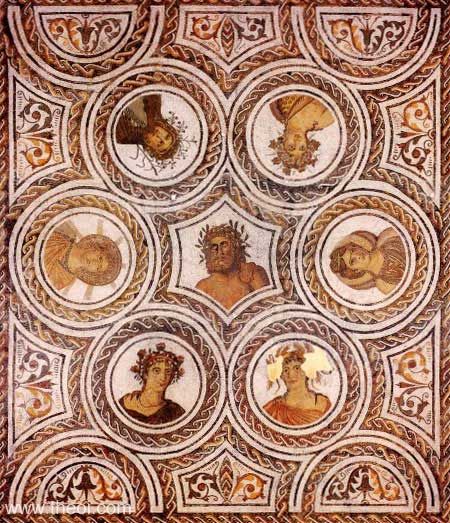
GENERAL LIST
Pseudo-Hyginus, Fabulae 183 (trans. Grant) (Roman mythographer C2nd A.D.)
:
"The names of the Horae, daughters of Jove [Zeus], son of Saturn [Kronos (Cronus)], and Themis, daughter
Titanidis (Titaness), are these : Auxo (Growth), Eunomia (Order), Pherusa (Substance), Carpo (Fruit), Dice
(Justice), Euporia (Abundance), Irene (Peace), Orthosie (Prosperity), Thallo (Green-shoots)."
[N.B. These appear to be three distinct groupings of three Horai :--(1) Eunome, Dike and Eirene (Irene); (2)
Auxo, Karpo (Carpo), Thallo; (3) Pherousa (Pherusa), Euporia, Orthosie (Orthosia).]
I. EUNOMIA, DIKE, IRENE (EIRENE)
Hesiod, Theogony 901 ff (trans. Evelyn-White) (Greek epic C8th or 7th B.C.)
:
"Next he [Zeus] led away bright Themis (Divine Law) who bare the Horai (Horae, Seasons), and Eunomia (Good
Order), Dike (Justice), and blooming (thallô) Eirene (Irene, Peace), who mind the works of mortal
men, and the Moirai (Moirae, Fates) to whom wise Zeus gave the greatest honour, Klotho (Clotho), and Lakhesis,
and Atropos who give mortal men evil and good to have."
[N.B. Eirene might also denote spring, and Eunomia good pastures.]
Pindar, Odes Fragment 30 (trans. Sandys) (Greek lyric C5th B.C.) :
"[Themis] the primal bride of Zeus Soter (Saviour). And she bare him the Horai (Horae, Seasons) with golden
fillet and gleaming fruit,--the Horai that are ever true."
Pseudo-Apollodorus, Bibliotheca 1. 13 (trans. Aldrich) (Greek mythographer C2nd A.D.)
:
"With Themis, the daughter of Ouranos (Uranus, Heaven), he [Zeus] fathered his daughters the Horai (Horae),
by name Eirene (Irene, Peace), Eunomia (Lawfulness), and Dike (Justice)."
Pausanias, Description of Greece 5. 17. 1 (trans. Jones) (Greek travelogue C2nd A.D.)
:
"The figures of Horai (Horae) next to them [statues of Hera and Zeus in the Heraion (Heraeum) at Olympia],
seated upon thrones . . . Beside them stands an image of Themis, as being mother of the Horai."
Orphic Hymn 43 to the Horae (trans. Taylor) (Greek hymns C3rd B.C. to 2nd A.D.)
:
"Daughters of Zeus and Themis, Horai (Horae) bright, Dike (Justice), and blessed Eirene (Peace) and Eunomia
(Lawfulness)."
Pseudo-Hyginus, Fabulae 183 (trans. Grant) (Roman mythographer C2nd A.D.)
:
"The names of the Horae, daughters of Jove [Zeus], son of Saturn [Kronos (Cronus)], and Themis, daughter
Titanidis (Titaness), are these : . . . Eunomia (Order) . . . Dice (Justice) . . . Irene (Peace), Orthosie
(Prosperity)."
II. CARPO (KARPO), AUXO, THALLO
Pausanias, Description of Greece 9. 35. 1 (trans. Jones) (Greek travelogue C2nd A.D.)
:
"Appropriate names for the Kharites (Charites, Graces) are those given by the Athenians, who from of old
have worshipped two Kharites, Auxo and Hegemone. [The third] Karpo (Carpo, Fruit) is the name, not of a Kharis
(Charis), but of a Hora. The other Hora is worshipped together with Pandrosos by the Athenians who call the
goddess Thallo (Blooming)."
[N.B. The Athenian goddesses Auxo, Karpo (Carpo) and Thallo were described as both Horai (Horae) and Kharites
(Charites). Pausanias is probably incorrect when he attempts to place these exclusively in one category or the
other.]
Pseudo-Hyginus, Fabulae 183 (trans. Grant) (Roman mythographer C2nd A.D.)
:
"The names of the Horae . . . Auxo (Growth) . . . Carpo (Fruit) . . . Thallo (Green-shoots)."
[N.B. In Hesiod's Theogony the Hora Eirene (Peace or Spring) is given the epithet thallô
"blooming."]
III. PHERUSA (PHEROUSA), EUPORIA, ORTHOSIE
Pseudo-Hyginus, Fabulae 183 (trans. Grant) (Roman mythographer C2nd A.D.)
:
"The names of the Horae . . . Pherusa (Substance) . . . Euporia (Abundance) . . . Orthosie
(Prosperity)."
HORAE GODDESSES OF THE ORDERING OF THE YEAR
Homer, Iliad 21. 450 ff (trans. Lattimore) (Greek epic C8th B.C.) :
"The changing Seasons (Horai) brought on the time for our labour to be paid."
Homer, Odyssey 2. 107 ff (trans. Shewring) (Greek epic C8th B.C.) :
"When Seasons (Horai) passed and the fourth year came."
Pindar, Paean 1 (trans. Sandys) (Greek lyric C5th B.C.) :
"Now hath the year in its full circle, and the Horai (Horae, Seasons), the daughters of Themis, come unto
Thebe's city that driveth the steed, bringing to Apollon the banquet that loveth the garland."
Pausanias, Description of Greece 1. 40. 4 (trans. Jones) (Greek travelogue C2nd A.D.)
:
"[In the temple of Zeus at Megara :] Above the head of Zeus are the Horai (Horae, Seasons) and Moirai
(Moirae, Fates), and all may see that he is the only god obeyed by Moira (Destiny), and the he apportions the
seasons as is due."
Nonnus, Dionysiaca 7. 7 ff (trans. Rouse) (Greek epic C5th A.D.) :
"The Father [Zeus] spoke, the Moirai (Moirae, Fates) applauded; at his words the lightfoot Horai (Horae,
Seasons) sneezed, as a presage of things to come."
[N.B. The Horai as goddesses of the passage of time were sisters of the Moirai or Fates. The ancients regarded
sneezes as an omen.]
Nonnus, Dionysiaca 8. 33 ff :
"Kronion's [Zeus'] attendants the Horai (Horae, Seasons) went their rounds about the sky."
Nonnus, Dionysiaca 38. 15 ff (trans. Rouse) (Greek epic C5th A.D.) :
"As soon as the Horai (Horae, Seasons) brought the seventh year."
See also:--
(1) Horae Personifications of the Four Seasons (below)
(2) Horae Goddesses of Fruiting and Flowering (below)
(3) Horae Guardians of the Gates of Heaven (below)
HORAE GUARDIANS OF THE GATES OF HEAVEN
The Horai (Horae) were the goddesses of heavenly order and as such were also represented as the guardians of the gates of heaven.
Homer, Iliad 5. 750 & 8. 393 ff (trans. Lattimore) (Greek epic C8th B.C.)
:
"Hera laid the lash swiftly on the horses [leaving heaven]; and moving of themselves groaned the gates of
the sky that the Horai guarded, those Horai (Horae, Hours) to whose charge the huge sky and Olympos (Olympus),
to open up the dense darkness or again to close it." [N.B. This same passage appears twice in the
Iliad.]
Pausanias, Description of Greece 5. 11. 7 (trans. Jones) (Greek travelogue C2nd A.D.)
:
"These [the Horai (Horae)] in epic poetry are included among the daughters of Zeus. Homer too in the
Iliad says that the Horai have been entrusted with the sky, just like guards of a king's court."
Philostratus the Elder, Imagines 1. 11 (trans. Fairbanks) (Greek rhetorician C3rd
A.D.) :
"[From a description of an ancient Greek painting at Neapolis (Naples) :] In his passion for driving this
son [Phaethon] of Helios (the Sun) ventured to mount his father's chariot, but because he did not keep a firm
rein he came to grief and fell into the Eridanos (Eridanus) . . . Look! Nyx (Night) is driving Hemera (Day) from
the noonday sky, and the sun's orb as it plunges toward the earth draws in its train the Astera (Stars). The
Horai (Horae, Hours) abandon their posts at the gates [of heaven] and flee toward the gloom that rises to meet
them."
Philostratus the Elder, Imagines 2. 34 :
"That the gates of heaven (ouranos) are in charge of the Horai (Horae, Seasons) we may leave to
the special knowledge and prerogative of Homer, for very likely he became an intimate of the Horai when he
inherited the skies."
Ovid, Fasti 1. 125 ff (trans.Boyle) (Roman poetry C1st B.C. to C1st A.D.)
:
"I [the Roman god Janus] sit at heaven's doors with the gentle Horae (Hours, Seasons): Jupiter [Zeus] goes
and comes through my office."
Nonnus, Dionysiaca 1. 223 ff (trans. Rouse) (Greek epic C5th A.D.) :
"[When the monster Typhoeus assaulted Heaven :] The Horai (Horae, Seasons) undaunted armed the starry
battalions, and the lines of heavenly Constellations in a disciplined circle came shining to the fray."
Nonnus, Dionysiaca 2. 170 ff (trans. Rouse) (Greek epic C5th A.D.) :
"[When the monster Typhoeus besieged Heaven :] It was night. Sentinels stood in line around Olympos and the
seven zones [of the stars], and as it were from the summit of towers came their nightly alarms; the calls of the
stars in many tongues were carried all abroad, and Selene's (the Moon's) turning-mark received the creaking echo
from Kronos' (Cronus', Time's) starting-point. Now the Horai (Horae, Seasons), guardians of the upper air,
handmaids of Phaethon [Helios the Sun], had fortified the sky with a long string of covering clouds like a
coronal. The stars had closed the Atlantean bar of the inviolable gates lest some stealthy troop should enter
the heavens while the Blessed ones were away : instead of the noise of pipes and the familiar flute, the breezes
whistled a tune with their wings through the night."
Nonnus, Dionysiaca 2. 270 ff :
"[Typhoeus threatens Zeus :] ‘Let the timid Horai (Seasons), Helios the Sun's handmaids, flee the
heavens under the shower of mountains!’"
Nonnus, Dionysiaca 2. 699 ff :
"[Zeus returning from his victory over the monster Typhon :] Swiftly turned his golden chariot toward the
round of the ethereal stars, while Nike (Victory) by his side drove her father's team with the heavenly whip. So
the god came once more to the sky; and to receive him the stately Horai (Horae, Seasons) threw open the heavenly
gates, and crowned the heavens. With Zeus victorious, the other gods came home to Olympos (Olympus), in their
own form come again, for they put off the winged shapes which they had taken on."
Nonnus, Dionysiaca 13. 22 ff :
"[Iris delivers a message from Zeus to the young god Dionysos :] ‘Come, lift the thyrsus of battle in
your hands, and earnheaven by your deeds. For the immortal court of Zeus will not receive you without hard work,
and the Horai (Horae, Hours) will not open the gates of Olympos to you unless you have struggled for the prize
[i.e. the Horai admit new gods into heaven].’"
HORAE GODDESSES OF SEASONAL FLOWERING & FRUITING
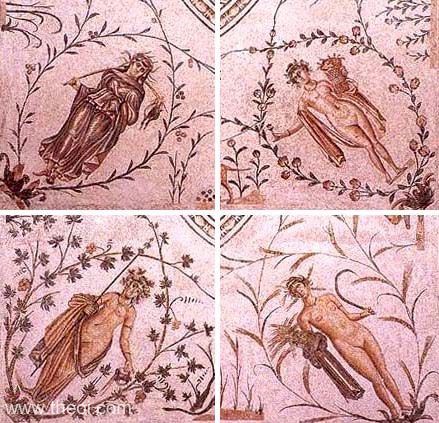
Homer, Odyssey 24. 343 ff (trans. Shewring) (Greek epic C8th B.C.) :
"Thirteen pear-trees, ten apple-trees, forty fig-trees . . . each of them bearing fruit in turn; there were
clusters on them of every degree of ripeness as the Horai (Horae, Seasons) of Zeus shed down their influence
from above."
Hesiod, Works and Days 69 ff (trans. Evelyn-White) (Greek epic C8th or 7th B.C.)
:
"[Pandora the first woman was created by the gods :] The rich-haired Horai (Horae, Seasons) crowned her
head with spring flowers."
Pindar, Odes Fragment 30 (trans. Sandys) (Greek lyric C5th B.C.) :
"[Themis] the primal bride of the Saviour Zeus. And she bare him the Horai (Horae, Seasons) with golden
fillet and gleaming fruit,--the Horai that are ever true."
Pindar, Dithyrambs Fragment 75 :
"Clearly seen are the bright symbols of sacred rites, whensoever, at the opening of the chamber of the
purple-robed Horai (Horae, Seasons), the fragrant spring bringeth the nectar-breathing plants. Then, oh then,
are flung on the immortal earth the lovely tresses of violets, and roses are entwined in the hair; then ring the
voices of songs to the sound of flutes; then ring the dances in honour of diadem-wreathed Semele [i.e. the
mother of the wine-god Dionysos]."
The Anacreontea, Fragment 5 (trans. Campbell, Vol. Greek Lyric II) (C5th B.C.)
:
"The Horai (Horae, Seasons)are bringing us the first delightful roses."
Corinna, Fragment 690 (trans. Campbell, Vol. Greek Lyric IV) (C5th B.C.) :
"Eos (Dawn), leaving the waters of Okeanos (Oceanus), drew from the sky the moon's holy light, while the
Horai (Horae, Seasons) came from immortal Zeus among spring's flowers."
Plato, Cratylus 400d & 410c (trans. Fowler) (Greek philosopher C4th B.C.)
:
"[Plato invents etymologies to explain the names of the gods :]
Sokrates (Socrates) : Let us inquire what thought men had in giving them [the gods] their names . . . The first
men who gave names [to the gods] were no ordinary persons, but high thinkers and great talkers . . . But why
should you not tell of another kind of gods, such as sun, moon, stars, earth, ether, air, fire, water, the
seasons, and the year? . . . The word hôrai (seasons) should be pronounced in the old Attic
fashion, horai, if you wish to know the probable meaning; êorai exist to divide winters
and summers and winds and the fruits of the earth; and since they divide (horizousi), they would
rightly be called horai."
Callimachus, Hymn 2 to Apollo 81 ff (trans. Mair) (Greek poet C3rd B.C.) :
"Thine [Apollon's] altars wear flowers in spring, even all the pied flowers which the Horai (Horae,
Seasons) lead forth when Zephyros (the West Wind) [of spring] breathes dew."
Diodorus Siculus, Library of History 5. 72. 5 (trans. Oldfather) (Greek historian
C1st B.C.) :
"The Horai (Horae, Seasons), as they are called, to each of them, according as her name indicates, was
given [i.e. assigned by Zeus] the ordering and adornment of life."
Orphic Hymn 43 to the Horae (trans. Taylor) (Greek hymns C3rd B.C. to 2nd A.D.)
:
"Horai (Horae, Seasons) . . . vernal and grassy, vivid, holy powers, whose balmy breath exhales in lovely
flowers; all-coloured Horai (Seasons), rich increase your care, circling, for ever flourishing and fair:
invested with a veil of shining dew, a flowery veil delightful to the view: attending Persephone, when back from
night the Moirai (Moirae, Fates) and Kharites (Charites, Graces) lead her up to light . . . With Mother
[Demeter] triumphing, and Zeus divine . . . give earth a store of blameless fruits to bea."
Philostratus the Elder, Imagines 1 (trans. Fairbanks) (Greek rhetorician C3rd A.D.)
:
"The invention of painting belongs to the gods--witness on earth all the designs with which the
Horai (Horae, Seasons) paint the meadows, and the manifestations we see in the heavens."
Philostratus the Elder, Imagines 1. 11 :
"[From a description of an ancient Greek painting from Neapolis (Naples) :] In his passion for driving
[Phaethon] this son of Helios (the Sun) ventured to mount his father's chariot, but because he did not keep a
firm rein he came to grief and fell into the Eridanos (Eridanus) . . . Look! Nyx (Night) is driving Hemera (Day)
from the noonday sky, and the Sun's orb as it plunges toward the earth draws in its train the Astera (Stars).
The Horai (Horae, Hours) abandon their posts at the gates [of heaven] and flee toward the gloom that rises to
meet them."
Philostratus the Elder, Imagines 2. 34 :
"[Ostensibly a description of an ancient Greek painting at Neapolis (Naples :] Horai (Horae,
Seasons). That the gates of heaven are in charge of the Horai we may leave to the special knowledge and
prerogative of Homer, for very likely he became an intimate of the Horai when he inherited the skies; but the
subject that is here treated in the painting is easy for a man to understand. For the Horai (Seasons), coming to
earth in their own proper forms, with clasped hands are dancing the year through its course, I think, and Ge
(Gaea, the Earth) in her wisdom brings forth for them all the fruits of the year.
‘Tread not on the hyacinth or the rose’ I shall not say to the Horai of the spring-time; for when
trodden on they seem sweeter and exhale a sweeter fragrance than the Horai themselves.
‘Walk not on the ploughed fields when soft’ I shall not say to the Horae of the winter-time; for if
they are trodden on by the Horai they will produce ear of grain. And the golden-haired Horae yonder are walking
on the spikes of the ears, but not so as to break or bend them; nay, they are so light that they do not even
sway the stalks.
It is charming of you, grape-vines, that ye try to lay hold of the Horai of autumn-tide; for you doubtless love
the Horae because they make you fair and wine-sweet.
Now these are our harvestings, so to speak, form the painting; but as for the Horai themselves, they are very
charming and of marvelous art. How they sing, and how they whirl in the dance! Note too the fact that the back
of none of them is turned to us; and note the raised arm, the freedom of flying hair, the cheek warm from the
running, and the eyes that join in the dance. Perhaps they permit us to weave a tale about the painter; for it
seems to me that he, falling in with the Horai as they danced, were caught up by them into their dance, the
goddesses perhaps thus intimating that grace (hora) must attend his painting."
Ovid, Fasti 5. 217 ff (trans.Boyle) (Roman poetry C1st B.C. to C1st A.D.)
:
"[Flora-Chloris the goddess of flowers speaks :] As soon as the dewy frost is cast from the leaves and
sunbeams warm the dappled blossom, the Horae (Seasons) assemble, hitch up their coloured dresses and collect
these gifts of mine in light tubs. Suddenly the Charites (Graces) burst in, and weave chaplets and crowns to
entwine the hair of gods."
Apuleius, The Golden Ass 6. 24 ff (trans. Walsh) (Roman novel C2nd A.D.) :
"[At the wedding of Cupid (Eros) and Psyche (Psykhe) :] The Horae (Seasons) brightened the scene with roses
and other flowers, the Gratiae (Graces) [Kharites] diffused balsam."
Apuleius, The Golden Ass 10. 30 ff :
"They [the Horai, Seasons] were appeasing the goddess [Aphrodite] by strewing wreaths and single blossoms
before her, and they formed a most elegant chorus-line as they sought to please the Mistress of pleasures with
the foliage of spring."
Colluthus, Rape of Helen 344 ff (trans. Mair) (Greek poetry C5th to 6th A.D.)
:
"She [Helene] hath gone to the meadow and sits on the dewy plain of the Horai (Horae, Seasons) . . . and
the paths of roses."
Nonnus, Dionysiaca 7. 7 ff (trans. Rouse) (Greek epic C5th A.D.) :
"The Horai (Horae, Seasons), those daughters of the lichtgang, still joyless, plaited garlands for the gods
only of meadow-grass. For Wine was lacking. Without Bakkhos [who was not yet born] to inspire the dance, its
grace was only half complete and quite without profit; it charmed only the eyes of the company."
Nonnus, Dionysiaca 10. 170 ff :
"The banks free of waves [of the river Patoklos (Pactolus) in Lydia] spirted up self-growing roses, the
lily sprouted, the Horai (Horae, Seasons) crowned the shores while Bakkhos (Bacchus) bathed."
HORAE GODDESSES OF THE FOUR SEASONS
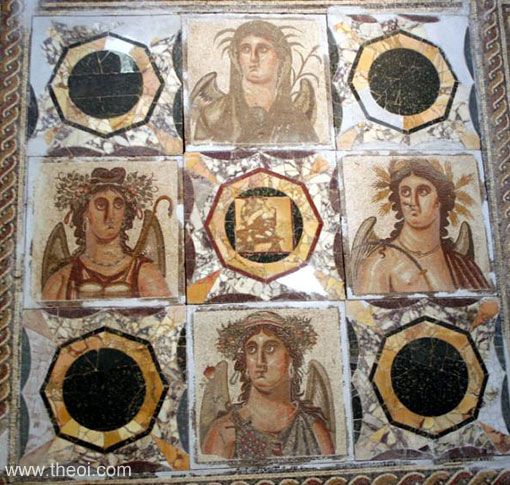
The Horai (Horae) sometimes personified the four seasons--Spring (Eiar), Summer (Theros), Autumn (Phthinoporon) and Winter (Kheimon). As such they were described as daughters of the sun-god Helios (Helius) who guided their father's path across the heavens and oversaw the flowering and fruiting of the earth.
Alcman, Fragment 20 (trans. Campbell, Vol. Greek Lyric II) (C7th B.C.) :
"And he [Zeus] created three seasons, Summer and Winter, and the third, Autumn, and Spring as a fourth,
when things grow but there is not enough to eat."
Quintus Smyrnaeus, Fall of Troy 10. 334 ff (trans. Way) (Greek epic C4th A.D.)
:
"[Paris of Troy lay dying, wounded by a poison arrow :] Hera beheld him, with rejoicing soul throned in the
Olympian palace-court of Zeus. And seated at her side were handmaids four whom radiant-faced Selene (the Moon)
bare to Helios (the Sun) to be unwearying ministers in Heaven, in form and office diverse each from each; for of
these Horai (Horae, Seasons) one was summer's queen, and one of winter and his stormy star, of spring the third,
of autumn-tide the fourth. So in four portions parted is man's year ruled by these Queens in turn--but of all
this be Zeus himself the Overseer in heaven. And of those issues now these spake with her which baleful Aisa
(Fate) in her all-ruining heart was shaping [i.e. the final chapter of the Trojan War] . . . Of these things
with her handmaids did the Queen of Heaven hold converse, and of many such, but Paris, while they talked, gave
up the ghost on Ida: never Helen saw him more."
Ovid, Metamorphoses 2. 24 ff (trans. Melville) (Roman epic C1st B.C. to C1st A.D.)
:
"Enrobed in purple vestments Phoebus [Helios the Sun] sat, high on a throne of gleaming emeralds. Attending
him on either side stood Dies (Day) and Mensis (Month) and Annus (Year) and Saecula (Century), and Horae
(Seasons) disposed at equal intervals between. Young Ver (Spring) was there, with coronet of flowers, and naked
Aestas (Summer), garlanded with grain; Autumnus (Autumn) was there with trampled vintage stained, and icy Hiems
(Winter), rime upon his locks."
Ovid, Metamorphoses 2. 118 ff :
"When Titan [Helio the Sun] perceived the Morning Star [Eosphoros] setting and saw the world in crimson
sheen . . . he bade the nimble Horae (Hours) go yoke his steeds, and they, swift goddesses, fastened the
jingling harness and the reins, as from the lofty stalls the horses came, filled with ambrosial food and
breathing flame."
Nonnus, Dionysiaca 11. 486 - 12. 116 ff (trans. Rouse) (Greek epic C5th A.D.)
:
"The rosycheek Horai (Horae, Seasons), daughters of the restless lichtgang their stormfoot father [Helios],
made a hast to the house of Helios (the Sun). One [Winter] wore a snowy veil shadowing her face, and sent forth
a gleam of subtle light through the black clouds; her feet were fitted with chilly hailstone shoes. She had
bound her braids about her watery head, and fastened across her brow a rain-producing veil, with an evergreen
garland on her head and a white circlet of snow covering her frost-rimed breast.
Another [Spring] puffed out from her lips the swallow-wind's breath which gives joy to mortal men, having banded
the spring-time tresses of her zephyrloving head with a fresh dewy coronet, while she laughed like a flower, and
fanned through her robe far abroad the fragrance of the opening rose at dawn. So she wove the merry dance for
Adonis [whose festival was in spring] and Kythereia (Cytherea) [Aphrodite] together.
Another [Summer], the harvest-home Season (Hora), came with her Sisters. In her right hand she held a head of
corn with grains clustering on the top, and a sickle with sharpcutting blade, forecrier of harvest; her maiden
form was wrapt in linen shining white, and as she wheeled the dance the fine texture showed the secrets of her
thighs, while in a hotter sun the cheeks of her drooping face were damp with dewy sweat.
Another [Autumn] leading the dance for an easy plowing, had bound about her hairless temple shoots of olive
drenches with the waters of sevenstream Nile. Scanty and withering was the hair by her temples, dry was her
body; for she is fruitpining Autumn who shears off the foliage from the trees with scatter-leaf winds. For there
were no vinebranches yet, trailing about the Nymphe's neck with tangled clusters and golden curls; not yet was
she drunken with purple Maronian juice beside the neatswilling winepress; not yet had the ivy run up with wild
intertwining tendrils. But then the fated time had come, which had brought the Horai (Horae, Seasons) running
together to the house of Helios (the Sun).
So these by the brows of western Okeanos (Oceanus) took ship for the mansion of Helios their father. As they
approached, Hesperos (Hesperus) the Evening Star leapt up and went out of the hall to meet them. Selene (the
Moon) herself also darted out newrisen, showing her light as she drove her cattle.
The Sisters at the sight of the lifegiving Charioteer stayed their fruitful step. He had just finished his
course and come down from the sky. Bright Phosphoros [the Morning Star] was ready for the fire-eyed driver, near
his chariot and four. He put away the hot yokestraps and starry whip, and washed in the neighbouring Okeanos
(Oceanus) stream the bodies of the firefed horses wet with sweat. The colts shook the dripping manes on their
necks, and stamped with sparkling hooves the shining mangertrough. The four were greeted by the twelve circling
Horai (Horae, Hours), daughters of Khronos (Chronos, Time), tripling round the fiery throne of the untiring
Charioteer in a ring, servants of Helios that attend on his shining car, priestesses of the lichtgang each in
her turn: for they bend the servile neck to the ancient manager o the universe.
Then up and spoke the grapetending Hora (Season) [i.e. Autumn], holding out her hook of the fruitpining autumn
as witness to her prayer: ‘Helios, giver of feason, plantdresser, lord of fruits! When will the soil make
winemother grapes to grow? Which of the blessed will have this honour betrothed him by Aion (Aeon) [Khronos,
Time]? Hide it not, I adjure you, because of all the Sisters I alone have no privilege of honour! I provide no
fruit, no corn, no meadowhay, no rain from Zeus.’
She spoke, and Helios cheered the nurse of the fruitage to come. He raised a finger, and pointed out to his
circling daughter close to a wall opposite the separated tablets of Harmonia. In these are recorded in one group
all the oracles which the prophetic hand of Phanes [Khronos, Time] first born engraved as ordained for the
world, and drew with his pencil the house proper for each [the astronomical house or zodiac sign]. And Hyperion
[Helios the Sun], dispenser of fire, added these words: ‘In the third tablet, you shall know whence the
fruitage of wine shall come--where is the Lion and the Virgin: in the fourth, who is the Prince of grapes--that
is where Ganymedes draws the delicious nectar, and lifts cup in hand in the picture.’
When the god had spoken, the wineloving maiden turned her eyes about, and ran to the place. Beside the oracular
wall she saw the first tablet, old as the infinite past, containing all things in one: upon it was all that
Ophion lord paramount had done, all that ancient Kronos accomplished . . .
But when the stormfoot Hora, Phaethon's [Helios the Sun's] handmaid, had seen the fiery shining victory of Zeus
at war and the hailstorm snowstorm conflict of Kronos (Cronus), she looked at the next tablet in its turn. There
was shown how the pine was in labour of the human race . . . how Raincloud Zeus brought the waters up in
mountainous seas on high and flooded all cities . . .
When the priestess of lichtgang passed with nimble foot to the third tabled, the circling maiden stood gazing at
the manifold oracles of the world's fate, in letters of flowing colour engraved with the artist's vermilion, all
that elaborate story which the primeval mind had inscribed; and this was the prophecy that she read in the
tablets : ‘[Various prophecies from the nymphe Io to Atalanta] . . .’
The Hora passed restless over all these on one tablet, until she came to the place where fiery Helios had
indicated the signs of prophecy to the wind-swept maiden. There was drawn the shining Lion, there the starry
Virgin was depicted in mimic shape, holding a bunch of grapes, the summergrown flower of fruitage: there the
daughter of Khronos (Chronos, Time) stayed her feet, and this is what she read : ‘Kissos (Cissus, Ivy),
the lovely youth, shall creep into a plant, and he shall by the highflying ivy that entwines about the branches.
From young Kalamos (Calamus) will spring a reed rising straight and bending to the breeze, a delicate sprout of
the fruitful soil, to support the tame vine. Ampelos (Ampelus, Vine) shall change form into a plant and give his
name to the fruit of the vine.’
But when the harvest-home maiden had seen all these prophecies, she sought the place where hard by on the
neighbouring wall was engraved the figure of Ganymedes pouring the nectar-juice into a golden cup. There was an
oracle engraved in four lines of verse. There the grape-loving goddess revelled, for she found this prophecy,
kept for Lyaios (Lyaeus) Ivybearer [Dionysos], ‘Zeus gave to Phoibos (Phoebus) [Apollon] the prophetic
laurel, red roses to the rosy Aphrodite, the grayleaf olive to Athena Greyeyes, corn to Demeter, vine to
Dionysos.’
That is what the Euian maiden saw on the tablets. She departed joyful, and with her Sisters was away to the
stream of the eastern Okeanos (Oceanus), moving along with Phaethon's [Helios the Sun's] team."
Nonnus, Dionysiaca 38. 235 ff :
"I [Helios the Sun] carry the measures of time (khronos), surrounded by the four Horai (Horae,
Seasons), about the same centre, until I have passed through a whole house [of the Zodiac] and fulfilled one
complete month as usual . . . Against Mene the moon [Selene] I move my rolling ball, the sparkling nourisher of
sheafproducing growth, and pass on my endless circuit about the turning-point of the Zodiakos (Zodiac), creating
the measures of time (khronos)."
Nonnus, Dionysiaca 38. 268 ff :
"When I [Helios the Sun] reach the Ram, the centre of the universe, the navel-star of Olympos, I [Helios]
in my exaltation let the Spring (Eiar) increase; and crossing the herald of the West-Wind (Zephyros), the
turning-line which balances night equal with day, I guide the dewy course of that Season (Eiar) [Hora] when the
swallow comes. Passing into the lower house, opposite the Ram, I cast the light equal day on the two hooves; and
again I make day balanced equally with dark on my homeward course when I bring in the leafshaking course of the
autumn Season (Phthinoporon) [Hora], and drive with lesser light to the lower turning-point in the leafshedding
month. Then I bring Winter (Kheimon, Cheimon) [Hora] for mankind with its rains, over the back of fish-tailed
Aigokereos (Aegocerus) [constellation Capricorn], that earth may bring forth her gifts full of life for the
farmers, when she receives the bridal showers and the creative dew. I deck out also corn-tending Summer (Theros)
[Hora] the messenger of harvest, flogging the wheatbearing earth with hotter beams."
Nonnus, Dionysiaca 48. 577 ff :
"The Horai (Horae, Seasons), handmaids of Helios (the Sun), to do grace to Lyaios (Lyaeus) [Dionysos],
painted with flowers the fountain's margin, and fragrant whiffs from the new-growing meadow beat on the balmy
air. There were the clustering blooms which have the name Narkissos (Narcissus) the fair youth . . . there was
the living plant of Amyklaian (Amyclaean) iris; there sang the nightingales over the spring blossoms, flying in
troops above the clustering flowers."
HORAE GODDESSES OF PEACE, JUSTICE & ORDER
As an extension of their function as the goddesses of the ordering of the year, the Horai (Horae) also presided over the ordering of human affairs personified as Good Order, Justice and Peace.
Pindar, Olympian Ode 13. 6 ff (trans. Conway) (Greek lyric C5th B.C.) :
"Here [in this city] dwells Eunomia (Good Order) and that unsullied fountain Dike (Justice), her sister,
sure support of cities; and Eirene (Irene, Peace) of the same kin, who are the stewards of wealth for
mankind--three glorious daughters of wise-counselled Themis (Order).
Far from their path they hold proud Hybris (Insolence), fierce-hearted mother of full-fed Koros (Corus, Disdain)
. . . But to you sons of Aletes, how often the Horai (Horae, Hours), decked in their wreaths, have given the
glory of the victor's triumph for supreme valour in the sacred games."
Greek Lyric V Anonymous, Fragment 1018 (from Stobaeus, Anthology) (trans. Campbell)
(Greek lyric B.C.) :
"Listen, Moirai (Moirae, Fates) . . . hear our prayers . . . send us rose-bloomed Eunomia (Good Order) and
her bright-throned sisters Dike (Justice) and garland-wearing Eirana (Irene, Peace), and make this city forget
its heavy-hearted misfortunes."
Diodorus Siculus, Library of History 5. 72. 5 (trans. Oldfather) (Greek historian
C1st B.C.) :
"To Zeus also were born, they say, the goddesses . . . Horai (Horae), as they are called, Eunomia (Good
Order) and Dike (Justice) and Eirene (Irene, Peace) . . . The Horai, as they are called, to each of them,
according as her name indicates, was given [assigned by Zeus] the ordering and adornment of life, so as to serve
to the greatest advantage of mankind; for there is nothing which is better to build a life of felicity than
obedience to law (eunomia) and justice (dike) and peace (eirene)."
For MORE information on the Horai as abstractions see DIKE, EIRENE, EUNOMIA
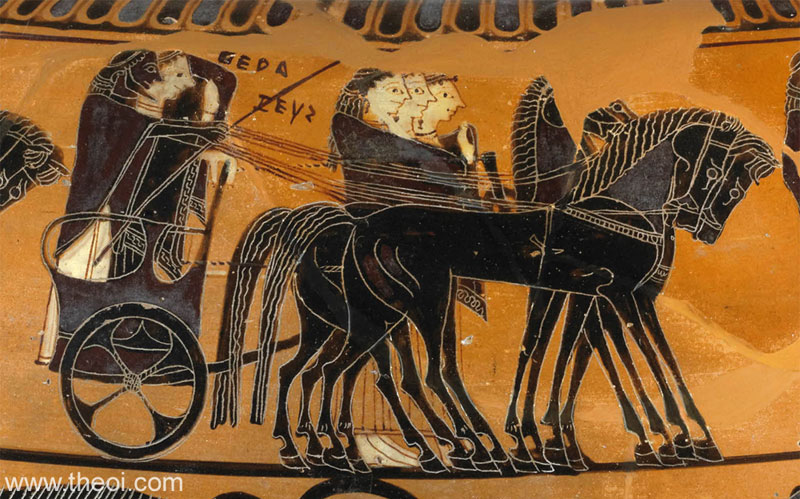
HORAE NURSES, MIDWIVES & ATTENDANTS OF THE GODS
The Horai (HOrae) were close companions of the gods of spring, such as Hera queen of the heavens, Aphrodite the goddess of procreation (including animals in spring), Hermes god of the herds and flocks, and Persephone goddess of the spring growth. They were often depicted as nature's midwives, as were their sisters, the Moirai or Fates.
I. NURSES & HANDMAIDENS OF HERA
Pausanias, Description of Greece 2. 13. 3 (trans. Jones) (Greek travelogue C2nd A.D.)
:
"Olen [legendary Greek poet, unknown date], in his hymn to Hera, says that Hera was reared by the Horai
(Horae, Seasons)."
Pausanias, Description of Greece 2. 17. 3 :
"[In the temple of Hera near Mykenai (Mycenae) in Argolis, the statue of the goddess] is wearing a crown
with Kharites (Charites, Graces) and Horai (Horae, Seasons) worked upon it."
Pausanias, Description of Greece 5. 17. 1 :
"[At Olympia :] In the temple of Hera is an image of Zeus, and the image of Hera is sitting on a
throne with Zeus standing by her . . . The figures of Horai (Horae, Seasons) next to them, seated upon
thrones."
Quintus Smyrnaeus, Fall of Troy 10. 334 ff (trans. Way) (Greek epic C4th A.D.)
:
"Hera . . . throned in the Olympian palace-court of Zeus. And seated at her side were handmaids four whom
radiant-faced Selene (the Moon) bare to Helios (the Sun) to be unwearying ministers in Heaven, in form and
office diverse each from each; for of these Horai (Horae, Seasons) one was summer's queen, and one of winter and
his stormy star, of spring the third, of autumn-tide the fourth."
For MORE information on this goddess see HERA
II. ATTENDANTS OF ZEUS
Pausanias, Description of Greece 1. 40. 4 (trans. Jones) (Greek travelogue C2nd A.D.)
:
"[In the temple of Zeus at Megara :] Above the head of Zeus [in his temple at Megara] are the Horai (Horae,
Seasons) and Moirai (Moirae, Fates), and all may see that he is the only god obeyed by Moira (Destiny), and the
he apportions the seasons as is due."
Pausanias, Description of Greece 5. 11. 7 :
"[Among the images decorating the throne of Zeus at Olympia :] On the uppermost parts of the throne
Pheidias has made, above the head of the image [of Zeus], three Kharites (Charites, Graces) on one side and
three Horai (Horae, Seasons) on the other."
Quintus Smyrnaeus, Fall of Troy 10. 334 ff (trans. Way) (Greek epic C4th A.D.)
:
"So in four portions parted is man's year ruled by these Queens [the Horai, Seasons] in turn--but of all
this be Zeus himself the Overseer in heaven."
III. NURSES & HANDMAIDENS OF APHRODITE
Homeric Hymn 6 to Aphrodite 2 ff (trans. Evelyn-White) (Greek epic C7th to 4th B.C.)
:
"[Aphrodite was born of the sea-foam near :] Sea-set Kypros (Cyprus) . . . and there the gold-filleted
Horai (Horae, Seasons) welcomed her joyously. They clothed her with heavenly garments : on her head they put a
fine, well-wrought rorwn of gold, and in her pierced ears they hung ornaments of orichale and precious gold, and
adorned her with golden necklaces over her soft neck and snow-white breats, jewels the gold-filleted Horai wear
themselves whenever they go to their father's house to join the lovely dances of the gods. And when they had
fully decked her, they brought her to the gods, who welcomed her when they saw her."
Homeric Hymn 3 to Pythian Apollo 186 ff :
"[Apollon] speeds from earth to Olympos (Olympus) , to the house of Zeus, to join the gathering of the
other gods : then straightway the undying gods think only of the lyre and song, and all the Mousai (Muses)
together, voice sweetly answering voice, hymn . . . Meanwhile the rich-tressed Kharites (Charites, Graces) and
cheerful Horai (Horae, Seasons) dance with Harmonia (Harmony) and Hebe (Youth) and Aphrodite, daughter of Zeus,
holding each other by the wrist."
Alcaeus, Fragment 308 (from Menander the rhetorician, Declamations) (trans. Campbell,
Vol. Greek Lyric I) (C6th B.C.) :
"Alkaios (Alcaeus) . . . deals with the mid-wifery of the Kharites (Charites, Graces) and the nursing of
the Horai (Horae, Seasons)."
Ibycus, Fragment 288 (trans. Campbell, Vol. Greek Lyric I) (C6th B.C.) :
"Euryalos (Euryalus), offshoot of the blue-eyed Kharites (Charites, Graces), darling of the lovely-haired
Horai (Horae), Kypris (Cypris) [Aphrodite] and soft-lidded Peitho (Persuasion) nursed you among
rose-blossoms."
Apuleius, The Golden Ass 10. 30 ff (trans. Walsh) (Roman novel C2nd A.D.)
:
"[From a description of an ancient Greek play portraying the Judgement of Paris :] Each maiden representing
a goddess was accompanied by her own escort . . . Next floated in charming children [attending Aphrodite],
unmarried girls, representing on one side the Gratiae (Graces) [Kharites (Charites)] at their most graceful, and
on the other the Horae (Seasons) [Horai] in all their beauty. They were appeasing the goddess by strewing
wreaths and single blossoms before her, and they formed a most elegant chorus-line as they sought to please the
Mistress of pleasures with the foliage of spring."
Nonnus, Dionysiaca 3. 380 ff (trans. Rouse) (Greek epic C5th A.D.) :
"The childbed Horai (Horae, Seasons) had just delivered her [Aphrodite's] baby [Harmonia] still wet, when
her breasts were tight and swollen with the gushing white sap."
Nonnus, Dionysiaca 41. 155 ff :
"The four Horai (Horae, Seasons) struck up a tune together, when Aphrodite brought forth her wonderful
daughter [Beroe]."
For MORE information on this goddess see APHRODITE
IV. COMPANIONS OF PERSEPHONE
Orphic Hymn 43 to the Horae (trans. Taylor) (Greek hymns C3rd B.C. to 2nd A.D.)
:
"[The Horai (Horae)] attending Persephone, when back from night the Moirai (Moirae, Fates) and Kharites
(Charites, Graces) lead her up to light [out of the Underworld in spring]; when in a band harmonious they
advance, and joyful found her form the solemn dance."
Orphic Hymn 29 to Persephone :
"[Persephone] associate of the Horai (Horae, Seasons), essence bright, all-ruling virgin, bearing heavenly
light. With fruits abounding, of a bounteous mind, horned, and alone desired by those of mortal kind. O vernal
queen, whom grassy plains delight, sweet to the smell, and pleasing to the sight: whose holy form in budding
fruits we view, earth's vigorous offspring of a various hue."
For MORE information on this goddess see PERSEPHONE
V. NURSES OF HERMES
Philostratus the Elder, Imagines 1. 26 (trans. Fairbanks) (Greek rhetorician C3rd
A.D.) :
"[From a description of an ancient Greek painting at Neapolis (Naples) :] Birth of Hermes . . . He is born
on the crest of Olympos (Olympus), at the very top, the abode of the gods . . . There the Horai (Horae, Seasons)
care for Hermes at his birth. The painter has depicted these also, each according to her time, and they wrap him
in swaddling clothes, sprinkling over him the most beautiful flowers, that he may have swaddling clothes not
without distinction. While they turn to [Maia] the mother of Hermes lying on her couch of travail, he slips out
of his swaddling clothes and begins to walk at once and descends from Olympos."
Philostratus, Life of Apollonius of Tyana 5. 15 (trans. Conybeare) (Greek biography
C1st to C2nd A.D.) :
"[Hermes] remembered the Horai (Horae, Seasons), by whom he himself had been nurtured on the peaks of
Olympos, and bethought how once, when he was still in swaddling clothes, they had told him a story about the
cow, which had a conversation with the man about herself and about the earth, and so set him aflame after the
cows of Apollon."
For MORE information on this god see HERMES
VI. NURSES OF ARISTAEUS (ARISTAIOS)
Pindar, Pythian Ode 9. 58 ff (trans. Conway) (Greek lyric C5th B.C.) :
"There shall she [Kyrene (Cyrene)] bear a son [Aristaios (Aristaeus)], whom glorious Hermes will take from
his fond mother's breast, and carry to the enthroned Horai (Horae, Seasons) and Mother Gaia (Gaea, Earth); and
they will gently nurse the babe upon their knees, and on his lips distil ambrosia and nectar, and shall ordain
him an immortal being, a Zeus or holy Apollon, a joy to men who love him."
[N.B. Aristaios was the rustic god of shepherds and beekeeping.]
For MORE information on this god see ARISTAIOS
VII. COMPANIONS OF PAN
Orphic Hymn 11 to Pan (trans. Taylor) (Greek hymns C3rd B.C. to 2nd A.D.)
:
"Throned with the Horai (Horae, Seasons), Bacchanalian Pan, goat-footed, horned, from whom the world began;
in endless dance and melody divine."
For MORE information on this god see PAN
VIII. MIDWIVES OF DIONYSUS
Nonnus, Dionysiaca 8. 3 ff (trans. Rouse) (Greek epic C5th A.D.) :
"For to Kronides (Cronides) [Zeus] Semele's house was lovely heaven, and the quickfoot Horai (Horae,
Seasons) of Zeus became the attendants in the palace of Kadmos (Cadmus)."
Nonnus, Dionysiaca 8. 33 ff :
"Round about the boy [i.e. Dionysos in the womb of Semele] Kronion's (Cronion's) [Zeus'] attendants the
Horai (Horae, Seasons) went their rounds about the sky."
Nonnus, Dionysiaca 9. 12 ff :
"[Dionysos was birthed from the thigh of Zeus :] No sooner had he [Dionysos] peeped out by this divine
delivery, than the childbed Horai (Horae, Seasons) crowned him with an ivy-garland in presage of things to come;
they wreathed the horned head of a bullshaped Dionysos with twining horned snakes under the flowers."
Nonnus, Dionysiaca 16. 392 ff :
"[The nymphe Nikaia (Nicaea) was impregnated by the god Dionysos :] When the time came for her delivery,
the lifewarming Horai (Horae, Seasons) played the midwives to a female child [Telete], and confirmed the
nine-circled course of Selene (the Moon)."
Nonnus, Dionysiaca 48. 794 ff :
"O midwife Horai (Horae, Seasons), be witness of her delivery."
For MORE information on the Horai & the birth of Dionysos see:
Horai Personifications of the Four Seasons (this page)
For MORE information on this god see DIONYSOS
IX. HANDMAIDENS OF HELIUS (HELIOS)
The Horai (Horae, Seasons) were often represented as the handmaidens of Helios the sun, who guided his seasonal path across the heavens.
For INFO on the as handmaidens of Helios the sun see:
Horae Personifications of the Four Seasons (above)
For MORE information on this god see HELIOS
X. NURSES OF DARDANUS (DARDANOS)
Nonnus, Dionysiaca 3. 195 ff (trans. Rouse) (Greek epic C5th A.D.) :
"Dardanos, Emathion's brother, was one whom the bed of Zeus had begotten, whom Dike (Justice) nursed and
cared for a the time when the Horai (Horae) ran to the mansion of Queen Elektra (Electra), bearing the sceptre
of Zeus, and the robe oHoraif Time, and the staff of Olympos, to prophecy the indissoluble dominion of the
Ausonian race [the Trojans]. The Horai brought up the baby; and by an irrevocable oracle of Zeus, the lad just
sprouting the flower of recrescent youth left Elektra's house, when for the third time a deluge of rain had
flooded the world's foundations with towering billows."
HORAE & THE CROWN OF ARIADNE
Pseudo-Hyginus, Astronomica 2. 5 (trans. Grant) (Roman mythographer C2nd A.D.)
:
"Crown [Constellation Corona]. This is thought to be Ariadne's crown, placed by Father Liber [Dionysos]
among the constellations. For they say that when Ariadne wed Liber on the island of Dia, and all the gods gave
her wedding gifts, she first received this crown as a gift from Venus [Aphrodite] and the Horae (Seasons)."
HORAE GODDESSES OF IMMORTALITY
The Horai (Horae) were regarded as goddesses of immortality: they guarded the gates of heaven, admitting only gods; were present as midwives and nurses of the gods; and delivered ambrosia, the food of the gods.
I. AMBROSIA, THE FOOD OF THE GODS
Quintus Smyrnaeus, Fall of Troy 4. 128 ff (trans. Way) (Greek epic C4th A.D.)
:
"Singing of Peleus' Bridal of Delight [the wedding of Peleus and Thetis], which all the blest Immortals
brought to pass by Pelion's crests; sang of the ambrosial feast when the swift Horai (Horae, Hours) brought in
immortal hands meats not of earth, and heaped in golden maunds; sang how the silver tables were set forth in
haste by Themis [i.e. the mother of the Horai] blithely laughing . . . sang how the Nymphai (Nymphs) in golden
chalices mingled ambrosia."
II. GUARDIANS OF THE PATH TO GODHOOD
Pausanias, Description of Greece 3. 19. 3 - 5 (trans. Jones) (Greek travelogue C2nd
A.D.) :
"[Among the scenes depicted on the throne of Apollon at Amyklai (Amyclae) near Sparta :] The Moirai
(Moirae, Fates) and Horai (Horae, Seasons), and with them Aphrodite, Athena and Artemis. They are carrying to
heaven Hyakinthos (Hyacinthus) and Polyboia (Polyboea), the sister, they say, of Hyakinthos [i.e. who were
granted immortality in heaven]."
Nonnus, Dionysiaca 13. 22 ff (trans. Rouse) (Greek epic C5th A.D.) :
"[Iris delivers a message from Zeus to the young god Dionysos :] ‘Come, lift the thyrsus of battle in
your hands, and earnheaven by your deeds. For the immortal court of Zeus will not receive you without hard work,
and the Horai (Horae, Hours) will not open the gates of Olympos (Olympus) to you unless you have struggled for
the prize [i.e. the Horai admit new gods into heaven].’"
For MORE info on the Horai as gatekeepers of heaven see:
Horae Guardians of the Gates of Heaven (above)
HYMNS TO THE HORAE
Orphic Hymn 43 to the Horae (trans. Taylor) (Greek hymns C3rd B.C. to 2nd A.D.)
:
"To the Horai (Horae, Seasons), Fumigation from Aromatics. Daughters of Zeus and Themis, Horai bright, Dike
(Justice), and blessed Eirene (Irene, Peace) and Eunomia (Lawfulness) right, vernal and grassy, vivid, holy
powers, whose balmy breath exhales in lovely flowers; all-coloured Horai (Seasons), rich increase your care,
circling, for ever flourishing and fair: invested with a veil of shining dew, a flowery veil delightful to the
view: attending Persephone, when back from night the Moirai (Moirae, Fates) and Kharites (Charites, Graces) lead
her up to light; when in a band harmonious they advance, and joyful round her form the solemn dance. With Mother
[Demeter] triumphing, and Zeus divine, propitious come, and on our incense shine; give earth a store of
blameless fruits to bear, and make these novel mystics' life your care."
CULT OF THE HORAE & CULT ART
I. MEGARA Main Town of Megaris (Southern Greece)
Pausanias, Description of Greece 1. 40. 4 (trans. Jones) (Greek travelogue C2nd A.D.)
:
"[In the temple of Zeus at Megara :] Above the head of Zeus are the Horai (Horae, Seasons) and Moirai
(Fates), and all may see that he is the only god obeyed by Moira (Destiny), and the he apportions the seasons as
is due."
II. Near MYCENAE (MYKENAI) Town in Argolis (Southern Greece)
Pausanias, Description of Greece 2. 17. 3 :
"[In the temple of Hera near Mykenai (Mycenae) in Argos, the statue of the goddess] is wearing a crown with
Kharites (Charites, Graces) and Horai (Horae, Seasons) worked upon it."
III. ARGOS Main City of Argolis (Southern Greece)
Pausanias, Description of Greece 2. 20. 5 :
"[Near the Khorea (Chorea) in Argolis city :] A little further on is a sanctuary of the Horai
(Horae)."
IV. SPARTA Main City of Lacedaimonia (Lakedaimonia) (Southern Greece)
Pausanias, Description of Greece 3. 18. 10 - 16 :
"[The throne of Apollon at Amyklai (Amyclae) near Sparta :] is supported by two Kharites (Charites, Graces)
and two Horai (Horae)."
V. OLYMPIA Village & Sanctuary in Elis (Southern Greece)
Pausanias, Description of Greece 5. 11. 7 :
"[Among the images decorating the throne of Zeus in his temple at Olympia :] On the uppermost parts of the
throne Pheidias has made, above the head of the image [of Zeus], three Kharites (Charites, Graces) on one side
and three Horai (Horae, Seasons) on the other. These in epic poetry are included among the daughters of Zeus.
Homer too in the Iliad says that the Horai have been entrusted with the sky, just like guards of a
king's court."
Pausanias, Description of Greece 5. 15. 2 :
"[At the shrine of Olympia :] Well, there is in the Altis, when you are about to pass to the left of the
Leonidaion, an altar of Aphrodite, and after it one of the Horai (Horae, Seasons)."
Pausanias, Description of Greece 5. 17. 1 :
"[At the shrine of Olympia :] In the temple of Hera is an image of Zeus, and the image of Hera is sitting
on a throne with Zeus standing by her, bearded and with a helmet on his head. They are crude works of art. The
figures of Horai (Horae, Seasons) next to them, seated upon thrones, were made by the Aeginetan Smilis. Beside
them stands an image of Themis, as being mother of the Seasons. It is the work of Dorykleidas (Dorycleidas), a
Lakedaimonian by birth and a disciple of Dipoenos (Dipoenus) and Skyllis (Scyllis)."
VI. MEGALOPOLIS Main City of Arcadia (Arkadia) (Southern Greece)
Pausanias, Description of Greece 8. 31. 1 :
"[At Megalopolis in Arkadia (Arcadia)] is an enclosure sacred to the Great Goddesses (Megalai
Theai) [Demeter and Persephone] ... Before it stands a table, on which are carved two Horai (Horae), Pan
with pipes, and Apollon playing the harp. There is also an inscription saying they are among the first
gods."
VII. ERYTHRAE (ERYTHRAI) Town in Ionia - Lydia (Asia Minor)
Pausanias, Description of Greece 7. 5. 9 :
"[By the temple of Athena in Erythrai (Erythrae) in Ionia :] The white marble images of Kharites (Charites,
Graces) and Horai (Horae) that stand in the open before the entrance."
ANCIENT GREEK & ROMAN ART
SOURCES
GREEK
- Homer, The Iliad - Greek Epic C8th B.C.
- Homer, The Odyssey - Greek Epic C8th B.C.
- Hesiod, Theogony - Greek Epic C8th - 7th B.C.
- The Homeric Hymns - Greek Epic C8th - 4th B.C.
- Pindar, Odes - Greek Lyric C5th B.C.
- Pindar, Fragments - Greek Lyric C5th B.C.
- Greek Lyric I Alcaeus, Fragments - Greek Lyric C6th B.C.
- Greek Lyric II Anacreontea, Fragments - Greek Lyric C5th - 4th B.C.
- Greek Lyric III Ibycus, Fragments - Greek Lyric C6th B.C.
- Greek Lyric III Simonides, Fragments - Greek Lyric C6th - 5th B.C.
- Greek Lyric IV Corinna, Fragments - Greek Lyric C5th B.C.
- Greek Lyric V Anonymous, Fragments - Greek Lyric B.C.
- Plato, Cratylus - Greek Philosophy C4th B.C.
- Apollodorus, The Library - Greek Mythography C2nd A.D.
- Theocritus, Idylls - Greek Idyllic C3rd B.C.
- Callimachus, Hymns - Greek Poetry C3rd B.C.
- Diodorus Siculus, The Library of History - Greek History C1st B.C.
- Pausanias, Description of Greece - Greek Travelogue C2nd A.D.
- The Orphic Hymns - Greek Hymns C3rd B.C. - C2nd A.D.
- Philostratus the Elder, Imagines - Greek Rhetoric C3rd A.D.
- Philostratus, Life of Apollonius of Tyana - Greek Biography C2nd A.D.
- Quintus Smyrnaeus, Fall of Troy - Greek Epic C4th A.D.
- Nonnus, Dionysiaca - Greek Epic C5th A.D.
- Colluthus, The Rape of Helen - Greek Epic C5th - 6th A.D.
ROMAN
- Hyginus, Fabulae - Latin Mythography C2nd A.D.
- Hyginus, Astronomica - Latin Mythography C2nd A.D.
- Ovid, Metamorphoses - Latin Epic C1st B.C. - C1st A.D.
- Ovid, Fasti - Latin Poetry C1st B.C. - C1st A.D.
- Apuleius, The Golden Ass - Latin Novel C2nd A.D.
OTHER SOURCES
Other references not currently quoted here: Statius Thebaid 3.410, Horace Odes 4.7.8, Lucian Dialogues of the Gods 10, Theocritus Idylls 15.104, Athenaeus 2.38, Pollux 8.106.
BIBLIOGRAPHY
A complete bibliography of the translations quoted on this page.
